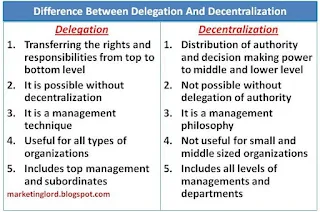The major differences between delegation of authority and decentralization are as follows:
1. Meaning
Delegation: Transferring the rights and responsibility from top level management to the lower level subordinates.
Decentralization: It is systematic distribution of authority and decision making power to the middle and lower level of management.
Delegation: Delegation of authority is possible with or without decentralization.
Delegation: Delegation of authority is management technique.
Delegation: Superior and immediate subordinate relationship.
Delegation: It is a process in the organization and a cause of decentralization.
2. Possibility
Delegation: Delegation of authority is possible with or without decentralization.
Decentralization: Decentralization is impossible without delegation of authority.
3. Technique
Delegation: Delegation of authority is management technique.
Decentralization: Decentralization of authority is management philosophy.
4. Relationship
Delegation: Superior and immediate subordinate relationship.
Decentralization: Top level management and various sections or departments relationship.
5. Process
Delegation: It is a process in the organization and a cause of decentralization.
Decentralization: It is the end result of delegation process or effect of delegation of authority.
6. Need
Delegation: It is important for all types of organizational.
Delegation: It is practiced to minimize the burden of top level manager.
Delegation: Top executive who is delegating the authority exercises controlling the organization.
Delegation: Easy to withdraw delegated authority at any time.
6. Need
Delegation: It is important for all types of organizational.
Decentralization: It is not essential for all types of organizational structure.
7. Purpose
Delegation: It is practiced to minimize the burden of top level manager.
Decentralization: Decentralization helps in preparing organizational participants.
8. Control
Delegation: Top executive who is delegating the authority exercises controlling the organization.
Decentralization: Departmental heads exercise controlling in decentralization.
9. Withdrawal
Delegation: Easy to withdraw delegated authority at any time.
Decentralization: Difficult to withdraw authority until the end result.
Also Read:
Difference Between Authority And Responsibility
10. Acceptance
Delegation: Subordinates can refuse delegation of authority.
Delegation: It is useful for all types of organizations.
Delegation: Top level manager is accountable.
Delegation: Responsibility lies with the top manager and is not delegated.
Delegation: It includes top level management and subordinates.
10. Acceptance
Delegation: Subordinates can refuse delegation of authority.
Decentralization: Less chance of refusing decentralization of authority.
11. Usage
Delegation: It is useful for all types of organizations.
Decentralization: It is not useful for small and medium sized organizations.
12. Accountability
Delegation: Top level manager is accountable.
Decentralization: Departmental heads and functional managers are accountable.
13. Responsibility
Delegation: Responsibility lies with the top manager and is not delegated.
Decentralization: Responsibility is transferred to the departmental heads.
14. Parties
Delegation: It includes top level management and subordinates.
Decentralization: It includes all level managers of different sections and departments.







